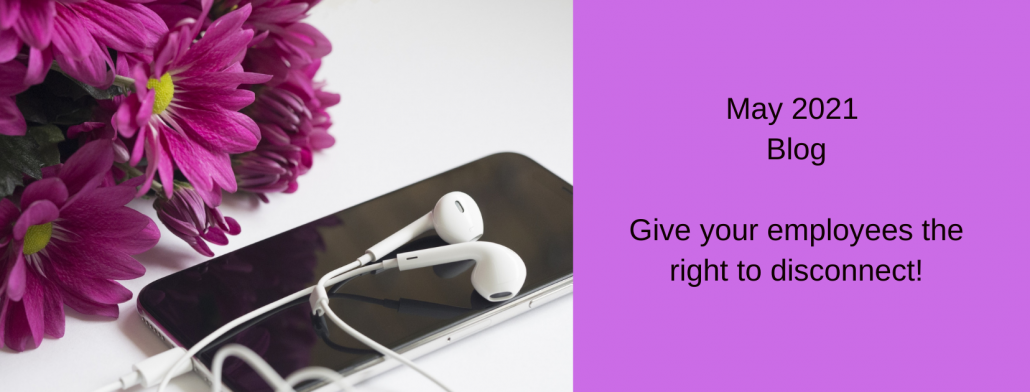
Give your employees the right to disconnect!
We currently live in a world where all the lines are blurred – school/work/child care/elder care are all under the same roof. Defined work spaces & defined work times don’t seem to exist anymore. For some of us the dining room table, in addition to being a place to eat, is also our home office and our children’s classroom. We have gone from families who used to be very independent and running in separate directions to work/school, sports, extra curricular activities and social activities – to spending 24/7 in the same house, sharing the same space.
Almost everyone owns some type of smartphone and we have become very attached to them. Every time it dings or vibrates – we HAVE TO look at it – we are Pavlov’s dog to technology! It is also common to have work email, instant messenger etc loaded on personal phones. Employees feel obliged to respond to emails or messages from their bosses at all hours. Gone are the days of leaving the office at 5pm – the office now follows you on your smartphone or laptop!
The Pandemic has opened our eyes and made us all more aware and more sensitive to the importance of our Mental Health. Millennials have entered our workplaces and shown us how strongly they prioritize work-life balance and that they are sometimes willing to leave an employer that doesn’t respect their right to that balance. Work-life balance is increasingly taking precedence over wages when employees are considering changing employers.
The right to “disconnect” refers to employees’ ability to fully break from work and not engage in work-related communications outside of work hours. Europe has led the way in instituting the employees’ right to disconnect. France’s right to disconnect came into force January 2017, it refers to employers’ obligation to stop encroaching on their employees’ personal and family lives with calls and emails.
Although not a legal requirement in Canada, employers can proactively take steps to create a workplace culture that acknowledges and respects work-life boundaries. By creating policies and guidelines to address the right to disconnect you will be showing your employees that you respect them as individuals and not just employees, value their loyalty and contribution to your workplace and are respectful to their mental and physical health. Many employers already support their employees with substantial Wellness Plans – why not include a Right to Disconnect Policy in that Wellness Plan. This type of policy may also be a valuable tool in attracting new talent.
